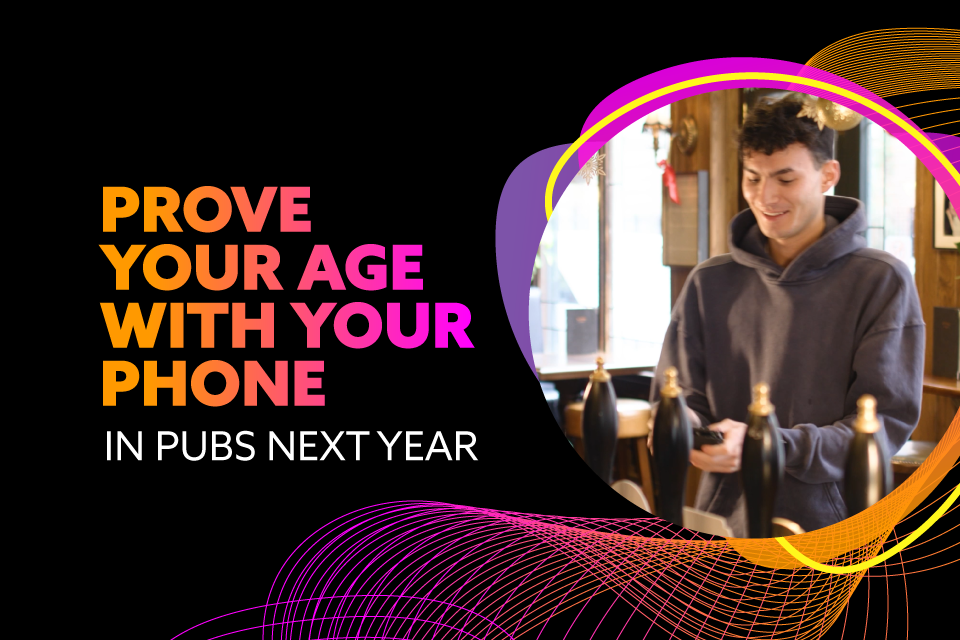- From next year, people can choose to use digital identities on their phones to prove their age when buying alcohol in high street pubs, clubs and shops – allowing landlords to serve pints more easily and reducing hassle in grocery queues.
- Digital identity sector generated £2 billion in revenue in the UK last year and employed over 10,000 people – half of which were outside London – in a further boost to the Prime Minister’s Plan for Change which will secure economic growth and living standards.
- The new laws will give people a voluntary, safe and secure way to prove their age without carrying physical documents, and make sure digital identities meet strict government standards.
Christmas celebrations are set to get a digital upgrade next year, as the UK government plans to roll out a new law allowing pub and bar-goers, as well as shoppers, to use their phones to prove their age when buying alcohol, should they wish to do so. People can continue to use physical forms of ID if they prefer.
Digital identities could slash waiting times at bars and help avoid hold-ups at automated tills, allowing landlords to serve thirsty customers more quickly and easing frustrations for high street shoppers, with digital IDs set to drive economic growth that will ultimately put more money in people’s pockets as part of our Plan for Change.
The legal changes will also mean that, by the time festive cheer fills the air again, carrying a bulky wallet to your favourite high street pub or risking losing valuable documents could be a thing of Christmas past. It also means that women will be safer on nights out, as they won’t have to show their driving license which risks revealing their address to bad actors.
Under the new system, people will be able to present secure digital identities as proof of age when buying alcohol, if they choose to. These digital identities, already provided by a host of companies, will have to be independently certified against government standards.
New insight, published today, reveals that companies providing these services generated £2.05 billion in 2023/2024, and employed over 10,000 people – half of which were outside London.
Productivity in the sector is also 42% higher than average levels across the economy, with each employee generating almost £80,000 of “gross value added” to the UK economy – with further support, such as these legal changes, expected to bolster this further.
Existing measures proposed in the Data (Use and Access) Bill will support the sector to boost the UK economy by £4.3 billion over the next decade.
Technology Secretary Peter Kyle said
This change benefits both consumers and businesses spurring the economic growth we need to put more money in the pockets of working people as part of our Plan for Change.
By next Christmas, you won’t need to carry a wallet or risk losing important documents like your passport or driver’s license when heading out to celebrate.
With a certified digital identity on your phone, you can raise a glass in your local pub without hassle – a merry step forward in making age verification safer, easier, and more convenient for everyone.
Kate Nicholls, Chief Executive of UK Hospitality, said
Digital ID can make life easier for both consumers and businesses, and we’re pleased to be supporting its introduction.
There are fewer things more frustrating than realising you’ve forgotten your ID when heading to a pub, bar or restaurant, and hopefully these new measures will make that a thing of the past. I look forward to working with the government on its smooth implementation, which minimises additional costs for businesses.
James Hawkins, from the British Beer and Pub Association (BPPA) said
This welcome change brings the Licensing Act in line with current technology and will make a visit to the pub easier for both customers and staff.
This additional way of carrying ID could be more convenient and reduce the risk of customers losing key ID documents when enjoying a night out.
If they want to use it, landlords and retailers will be able to scan digital identities to verify a customer’s age without customers unnecessarily disclosing personal information like their name or address, as is often the case with driver’s licenses.
When a digital identity is presented in person, a quick programmatic check – like scanning a QR code or using NFC, the technology behind contactless bank cards which people use every day – will ensure everything is seamless and hassle-free.
Landlords will be able to choose from a host of digital verification service providers to help them check ages securely and quickly, with over 50 such companies already independently certified against the UK Digital Identity and Attributes Trust Framework.
A recent consultation revealed support for updating the Licensing Act 2003 to allow digital identities to be used for alcohol sales. Respondents also endorsed the idea that providers of digital identity services should meet stringent government-approved standards under the framework.
To ensure stronger oversight, the Data (Use and Access) Bill, introduced in Parliament this year, seeks to place the framework on a statutory footing. Once passed, the Bill will pave the way for certified digital identities to be added to the list of accepted age verification methods, alongside traditional forms like passports and driver’s licenses.
By the time Britain is enjoying a festive tipple next year, landlords and retailers will have access to a public register on GOV.UK listing certified digital identity services. These digital identity services will offer a secure and convenient way to verify age for alcohol purchases, ensuring that celebrations can be merry, bright, and free from outdated processes.

